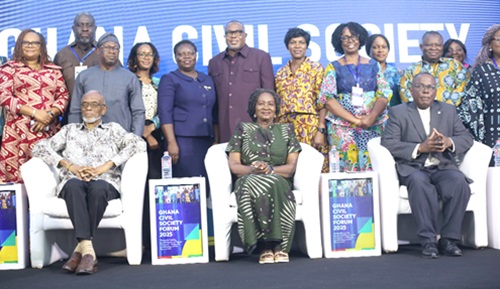The Vice-President, Professor Naana Jane Opoku-Agyemang, has said that the government will work and collaborate with civic stakeholders to build consensus towards the passage of the Non-Profit Bill into law.
“There is currently no specific law in place that facilitates the activities of CSOs and nurtures the development of the civil society space,” she said.
Speaking at the 2025 Ghana Civil Society forum in Accra yesterday, Prof. Opoku-Agyemang said the government would enhance tax incentives to encourage the local philanthropic ecosystem and deepen partnerships with community-led initiatives targeting social and economic challenges.
“We will examine our policies and legislation to ensure easier registration of NGOs, community foundations, and philanthropic organisations,” Prof. Opoku-Agyemang said.
Forum
Organised by STAR-Ghana Foundation, a non-profit organisation, the forum was on the theme, “Reimagining Development Financing and Civil Action-Challenges, Opportunities and the way Forward”.
The two-day event is to deepen the collective understanding of the evolving development financing landscape and its implications for civic action in Ghana.
It also seeks to strengthen cross-sectoral partnerships among and between civil society organisations (CSOs), the government, the private sector and international actors to support sustainable development.
The event brought together CSOs, government officials, youth advocates, traditional leaders, academics and development partners.
Also present at the event included the Presidential Staffer and Special Aide to the Vice-President, Prof. Theresah Ennim; the Policy Advisor, Political Affairs, Dr Samuel Ofosu Ampofo, and Policy Advisor, Finance, Mansa Amoa Awuah.
Self-sufficiency
The Vice-President said it was important for the country to work hard towards self-sufficiency and move away from aid dependency to ensure sustainable growth through domestic investment and inclusive financial innovation.
Prof. Opoku-Agyemang said the country, like many in the Global South, was under pressure while the World Bank’s official development assistance, historically a cornerstone of development financing, was now declining along with traditional aid flows.
She said many donor countries were grappling with political shifts, leading to aid cuts or reallocation away from development cooperation.
“External concessional financing is also increasingly limited. Public debt is rising.
And the fiscal space for government to respond to basic needs is becoming narrower,” the Vice-President said.
“All these signals that we cannot rely on aid as the primary engine of development. We are being challenged to think differently and, as a government, create an enabling environment to boost domestic investment and mobilise new forms of financing,” she added.
Reimaging
Prof. Opoku-Agyemang said the country and many African nations were reexamining models that rely solely on aid.
“We are deepening domestic resource mobilisation, broadening the tax base, and reforming the public financial management system,” she said.
Prof. Opoku-Agyemang said the government was also committed to creating an enabling environment where civic actors would be empowered.
CSOs speak
The Executive Director of STAR-Ghana Foundation and Convener of the forum, Alhaji Ibrahim-Tanko Amidu, said that most CSOs in the country relied heavily on funding from bilateral donors and philanthropic foundations adding that, “The shrinking of international aid has serious implications — not just for the financing of civil society activities — but for the very survival of the sector”.
He encouraged young people to explore new and unconventional ways of organising civic efforts that break free from outdated models.
“We must rethink what civil society looks like, how it operates, and how it brings stronger, younger, and more diverse voices into national development conversations,” Mr Amidu added.
The United Nations Resident Coordinator in Ghana, Osama Makawi, in a speech read on her behalf by the UNESCO Country Representative, Edmond Moukala, reaffirmed its commitment to support the country’s national development priorities through strengthened partnerships, innovative financing mechanisms and inclusive policy dialogue.

